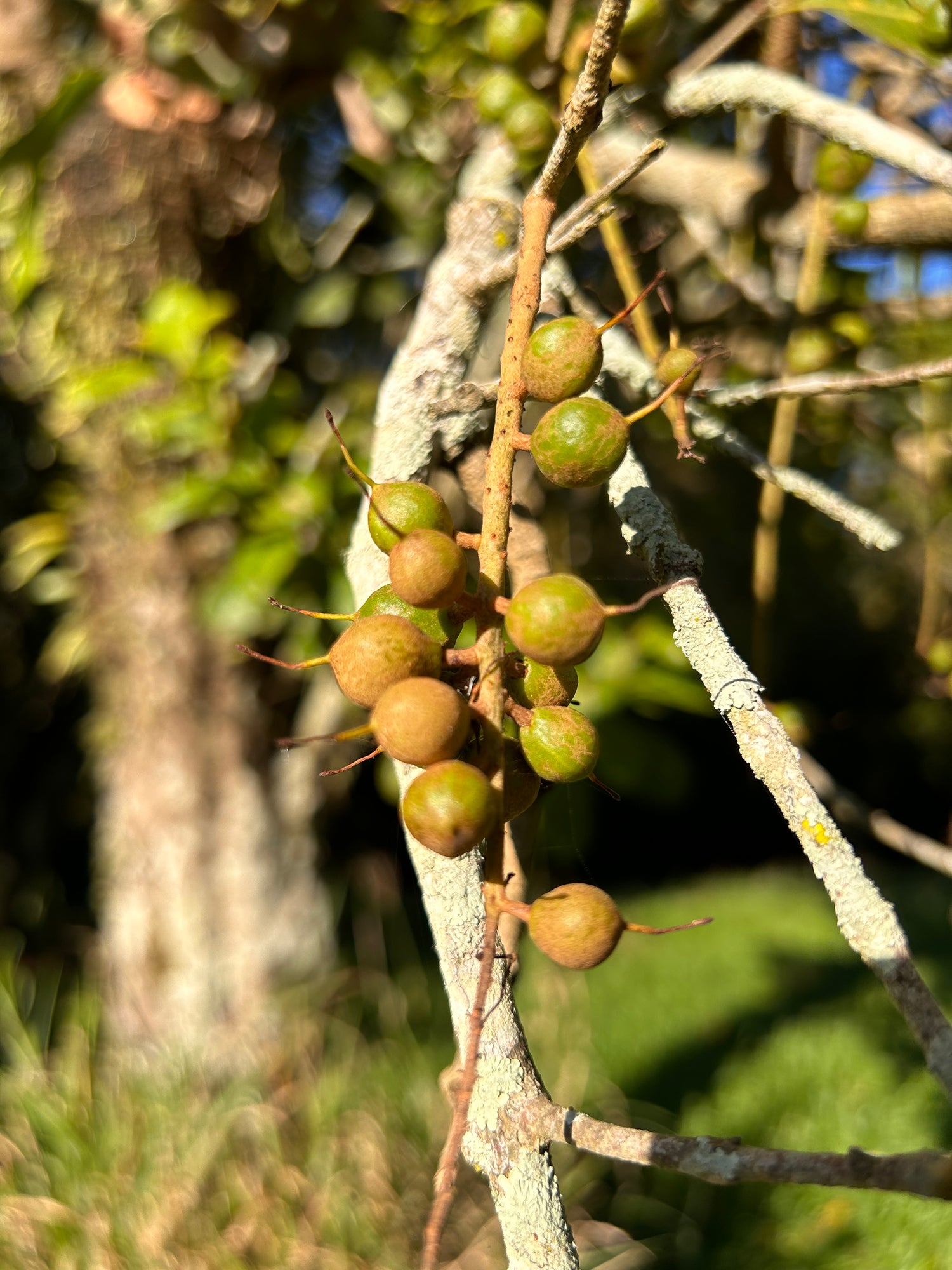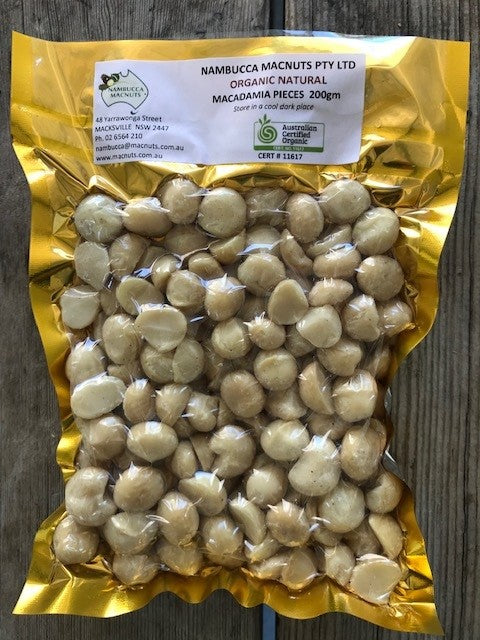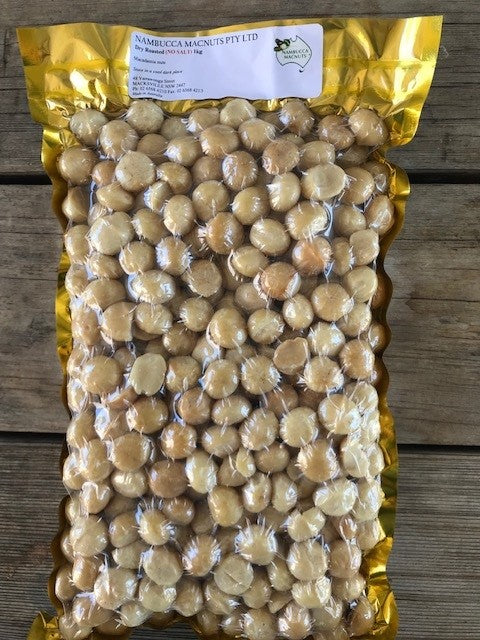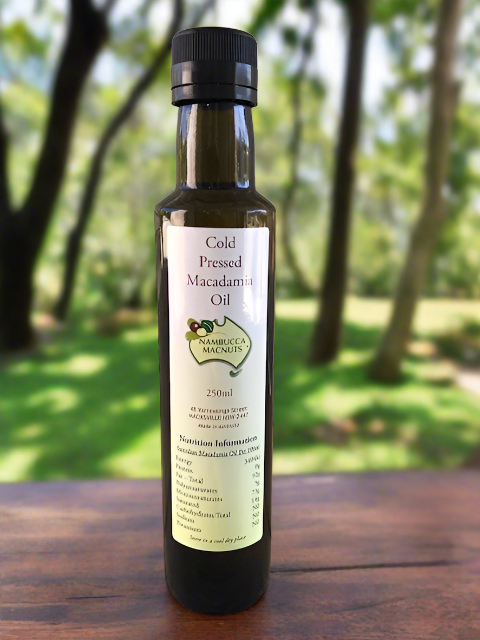
Nutrition
We offer more than just gourmet pleasure. Our products provide a wonderful source of nutrition. Experience the satisfaction of treating yourself, while nourishing your body.
The Surprising Health Benefits of Australian Macadamia Nuts
Australian macadamia nuts and their products offer a delicious treat that's not just tasty, but incredibly healthy too. Rich in essential nutrients and beneficial fats, these versatile nuts can elevate your wellness journey. Here’s how:
Nutrient-Rich Composition
High Energy Food: Macadamia nuts are energy-dense, providing a satisfying boost for your day.
Mono-Unsaturated Fats: Their oil contains 78% mono-unsaturated fats, which are considered heart-healthy and can:
- Help reduce bad LDL cholesterol.
- Promote good HDL cholesterol.
- Support overall cardiovascular health.
Protein Powerhouse: While low in lysine, macadamias are high in arginine, an amino acid beneficial for:
- Improving blood flow.
- Supporting heart health.
Rich in Minerals
- Calcium for bone strength.
- Potassium to support muscle and nerve function.
- Dietary Fibre: Supports digestion and aids in maintaining a healthy gut.
- Low Sodium: Ideal for those managing their salt intake.
Versatile Culinary Uses
Natural & Raw: Enjoy them right out of the shell for a quick, satisfying snack.
Dry Roasted or Cooked in Oil: Their buttery flavour shines when roasted or incorporated into oils.
In Recipes: Enhance the flavours of your favourite dishes, like:
- Cakes & Confectionery: Add a nutty crunch to your desserts.
- Ice Cream: Perfect as a topping or mix-in.
- Salads: Adds texture and richness to your greens.
- Roasts & Casseroles: Gives a gourmet twist to your savoury dishes.
Delicious and Nutritious
Indulge guilt-free in the rich, buttery flavour of macadamia nuts while supporting your health. From heart health to digestive wellness, their benefits are as limitless as your culinary imagination.

Macadamia Nuts
SUMMARY OF HEALTH BENEFITS
- No cholesterol
- Rich in fibre
- Very high in mono-unsaturated fat
- Rich in vitamins, minerals and antioxidents
- Excellent source of disease fighting nutrients & antioxidants
- Not genetically modified
- 30g (12 - 15 nuts) daily reduces cholesterol
- Supports gut health
Healthy Choices Collection
Our Healthy Choices collection includes organic and premium natural nuts, virgin cold pressed oil, all natural nut butter and a hint of dark chocolate for a delicious guilt-free treat.
-
Organic Natural Raw Macadamia Nuts
Regular price From $14.00 AUDRegular priceUnit price / per -
All Natural Macadamia Nut Butter
Regular price From $16.00 AUDRegular priceUnit price / per -
Dry Roasted Macadamia Nuts (No Salt)
Regular price From $14.00 AUDRegular priceUnit price / per -
Cold Pressed Premium Macadamia Oil 250ml
Regular price $12.99 AUDRegular priceUnit price / per
Nutritional Properties
Oils
The oils in macadamia are:
- 84% monounsaturated
- 12.5% saturated
- 3.5% polyunsaturated.
The monounsaturated portion contains oleic fatty acid plus the highest known level of palmitoleic fatty acid. This is also present in beneficial fish oils.
Monounsaturated fatty acids are the ‘good’ fats. They have been shown in macadamias to significantly reduce blood serum cholesterol levels, as well as enhancing the protective high-density lipoproteins and suppressing undesirable low-density lipoproteins.
The macadamia nut contains the highest level of monounsaturated fatty acids of any natural commercial food.
Macadamias contain no cholesterol. Macadamias contain no trans fatty acids. Macadamias improve the balance between omega 6 and omega 3 fatty acids. This facilitates the body’s manufacture of essential fatty acids and eicosanoids (prostaglandins etc).
Proteins
Macadamias contain significant proteins, comprising essential and non-essential amino acids. These play an important role in building muscle structure, connective tissues and developing blood plasma. Macadamias contain all the essential amino acids with most of these present at optimum levels.
Carbohydrates
Most of the ‘simple’ carbohydrates are present as saccharides (sugars). Macadamias contain the sugars: sucrose, fructose, glucose and maltose, plus some starch-based material. Carbohydrates supply energy to the body. Complex carbohydrates are described as dietary fibre.
Dietary Fibres
Dietary fibre is the term for carbohydrates that are resistant to enzyme digestion in the stomach. They consist of complex soluble carbohydrates and soluble fibres such as lignans, hemicellulose, amylopectins, mucilage, gums and insoluble cellulose. The dietary fibre in macadamias are the cell walls within the kernel. Dietary fibre promotes satiety, provides roughage, slows digestion and reduces hunger, promotes desirable intestinal bacteria and reduces constipation.
Minerals & Vitamins
Macadamias contain a large range of minerals. They are rich in: iron, potassium, phosphorus, magnesium and calcium. They also contain significant levels of zinc, copper, selenium. The most significant vitamins are: Vitamin E, Thiamine (B1), Riboflavin (B2), Niacin (B3), Pantothenic acid (B5) and Folate (B9).
Phytonutrients (phytochemicals)
These are biologically active components which protect our body’s systems. Many act as antioxidants that scavenge the free radicals that oxidise blood fats. Macadamias contain tocopherols and tocotrienols, which are derivatives of Vitamin E, as well as phytosterols such as sitosterol and also selenium.
Macadamias contain the phytonutrients classes: phenolic compounds, flavonoids, phytoestrogens, phytic acids, ellargic acid, saponins and lignans.

Macadamia Nutrition Facts 100g
| Nutritional LIST | Macadamia nuts (raw kernel): Per 100g serve |
| Energy | 3040kJ |
| Protein | 9.2g |
| Fat | 76.4g |
| – Monounsaturated | 63.4g |
| – Polyunsaturated | 3.0g |
| – Saturated | 10.0g |
| Carbohydrates | 10.0g |
| – Sugars | 4.0g |
| Dietary Fibre | 7.0g |
| Cholesterol | NIL |
| Phosphorus | 241 mg |
| Calcium | 53mg |
| Sodium | 3mg |
| Potassium | 409mg |




